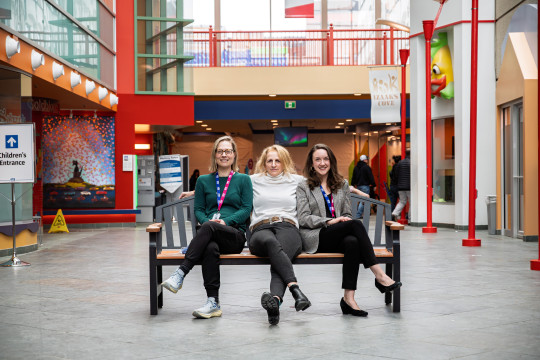L to R: Annette Flanders, RN, Mary Stuart, NP, and Dr. Chelsea Ash of the AYA Pediatric Cancer Survivorship program. Photo by Ryan Wilson
Adolescent and Young Adult (AYA) Cancer Awareness Week is recognized around the world each year during the first week of April (this year from April 7 to 11). It was established to shed a light on the unique issues that young people (between the ages of 15-39) living with cancer face due to their age at diagnosis.
This year a Canadian study published in the Lancet highlighted that AYAs have had less survival improvements when compared to younger and older cancer survivors. In addition to this, young people may experience:
- A loss of independence
- Challenges with fertility due to cancer and its treatment
- Interrupted careers and education opportunities
- Financial toxicity
- Isolation
- Impacts on their romantic relationships
And there are other impacts to adult survivors of pediatric cancer.
Chelsea, an adult survivor of AYA cancer, noted that a mental health intervention would have been helpful to her both during the treatment and once treatment had ended. She was 15 years old when she was diagnosed with Hodgkin's Lymphoma.
“Once you stop treatment and are told you are cured, you feel like you are dropping off a cliff,” says Chelsea. “You must reintegrate back into life without any mental health support at all, and that is a huge challenge.”
And three years off treatment were even harder on her. Chelsea experienced both health anxiety and social anxiety with no one there to help navigate her feelings.
“There are protocols for surveillance of the physical body after treatment, but no surveillance of mental health to match the lifelong physical surveillance and there should be.”
IWK Health is part of a provincial research initiative to develop an AYA cancer survivorship program that acknowledges the age, development, and long-term implications of AYA cancer survivors. For many AYA cancer survivors, their cancer journey is lifelong. Most require lifelong screening and treatments for ongoing long-term and late effects such as increased risk of secondary cancers, heart and cardiovascular complications, endocrinopathies and fertility problems.
#AYACSM (Adolescent and Young Adult Cancer Societal Movement), co-founded by Dr. Emily Drake in 2013, connects those invested in AYA cancer issues on social media. With over 320 million impressions on X and over a decade of tweet chats, the #AYACSM community now hosts monthly advocacy chats on BlueSky at 8pm EST on the first Tuesday of the month where they discuss and brainstorm advocacy challenges pertaining to furthering the AYA cancer field.
